Date of Induction: 1 November 2014 Category: Female Group
The story of the Marvelettes is a fascinating insight into the early beginnings of the black musical scene in Detroit that would export ‘The Sound Of Young America’ to the rest of the world. With Berry Gordy’s embryonic record company starting to emerge as a major player on the city’s musical landscape, the songs of the Marvelettes resonated with a whole slew of categories of music fans, from Pop music lovers to staunch soul collectors, many of their waxings have not only stood the test of time but have garnered new fans along the way. One of Berry Gordy’s earliest successes on his own label and a group that probably financed the development of a few more, The Marvelettes, rose to the very highest echelons of the music industry as very young teenagers even prior to graduating from the Inkster High School but that pinnacle was only enjoyed fleetingly and the group seemed to be side-lined for a while until Smokey Robinson came to their rescue with a series of songs that rekindled their careers and solidified their position in soul music history. A position that is highlighted here, as they become the inaugural Inductee for our Hall Of Fame Female Groups.
So how did a group of young impressionable teenage girls come to be Motown’s first #1 hit artists? The answer lays in a story that starts in a small town in Wayne County, lying approximately 15 miles West of Detroit, along Michigan Avenue. It was here, in a small town named after a successful Scottish immigrant from the Shetland Islands, Robert Inkster who owned the local sawmill in the mid 1800s, that five young teenage girls with a penchant for group harmony singing first got together while students at the local Inkster High School. Gladys Horton, Katherine Anderson , Georgeanna Tillman, Juanita Cowart, and Georgia Dobbins were classmates at the school, Gladys being a year younger than the others and it was in order to compete in the school’s annual talent show, organised by the Inkster High School Music Teacher Dr Romeo Phillips, that Gladys searched around for fellow singers and the youngsters took their first steps towards a professional career.
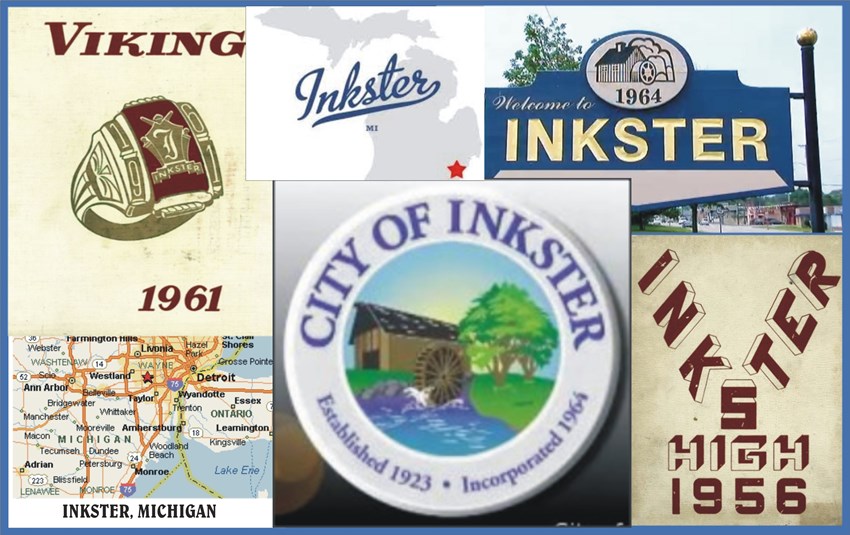
Gladys Catherine Horton was born on 30 May 1945 in Gainesville Florida, to parents originally from the West Indies. Given up for adoption at the tender age of nine months old, she spent much of her formative years in foster homes before settling with the Jones family on Harriet Street, Inskter. Church played a large role in her early musical experience and she became a regular with the Millenarian Specials, her local church choir. At fourteen years old she and three school friends’ Jeanette and Juanita McClaflin and Rosemary Wells, formed a singing quartet named The Del-Rhythmetts and even managed to get Joe Van Batte, a local record store owner to record them. (1) The release, The De-Rhythmetts — “I Need Your Love b/w Chic A Boomer” — JVB 500 which was recorded in 1959 and is a real old school attempt at a doo wop ballad, slid into obscurity without causing so much as a ripple in the market but did receive some local airplay which must have thrilled the young ladies. The single sparse guitar accompaniment on the A side is augmented by a pretty mean tenor sax player and the flip has an equally adept flautist involved, so maybe some-one showed a little faith in the youngsters.
Katherine Elaine Anderson was born 16 January 1944 in Ann Arbor, Michigan the eldest of four siblings and credits her parents and Grandparents with instilling a love of singing. Raised in Inkster she too was a member of her local church youth choir and was singing as early as elementary school. Katherine also studied ballet as a youngster.
Wyanetta Cowart was born 8 January 1944 in Rockport Mississippi once again as the eldest child and soon moved to Inkster with her parents. Her early musical influences were Billie Holiday and Sarah Vaughan.
Georgeanna Marie Tillman was born 5 February 1944 in Inkster and named after her father George whilst Georgia Marie Dobbins was born a few months later on 8 May 1944 in Carthage Arkansas and moved to Inkster at aged four when her family moved into the Willow Run Projects between Ann Arbor and Detroit, after her father took advantage of homes specially constructed for World War Two veterans, having served his country in The Pacific. She too was a fan of Sarah Vaughan and sang in the Willow Run Baptist Church choir. Another notable Willow Run Choir member at the time, who would make a name for himself, was Nick Ashford of Ashford and Simpson fame. The young Georgeanna was also a trombonist in the school band and as a teenager she was a member of a local singing group first named The Teen Hoppers and later The Shamrocks. The girls in there pretty green dresses must have been a sight for sore eyes. When the Dobbins family had to vacate their home when the Willow Run Projects were demolished they move to Inkster and Georgeanna became a student at the High School there. Georgia had been part of a number of singing groups that had previously won the annual competition and had already graduated when Gladys approached her to join the group for one last entry.
“I already had a mind to ask Georgia to be part of my group. I knew she was the key to our success. She was not only smart but she was kind and sympathetic to us freshmen She was also very attractive, all the girls looked up to her, wanting to be like her.“ — Gladys Horton (2)
The five young hopefuls started their rehearsal routine and finally settled on the name ‘The Casinyets’ a play on the phrase ‘Can’t Sing Yet’. The competition had, as its prize, three auditions for the new record company owned by a certain Berry Gordy and operating out of 2648 West Grand Boulevard in Detroit but the Casinyets hopes were dashed when, using a piano player from school as backing, they came fourth, despite believing they had done enough to emerge victorious. That could so well have been the end of the story but in one of those moments in life when karma plays its part to the full, one of the school counsellors Ms Shirley Sharpley commiserated with the girls and was convinced by them to call Motown and see if an audition could be organised. Motown agreed to hear the girls sing and they, along with Ms Sharpley and via a late arrival due to a flat tire, arrived at ‘Hitsville’ in April 1961 to be met by Motowns A&R supremo, Robert Bateman.
The girls auditioned, using songs by The Chantels and The Shirelles, they had rehearsed for the school’s competition and on the conclusion of the session were identified as having great potential but needed original material. Berry Gordy himself attended one of the songs, with Georgia on lead vocal and told them to come back when they had their own material. The hunt was on for a song.
On restarting their rehearsals back at Georgeanna’s house in Inkster, Georgia introduced an acquaintance of hers, a local pianist named William Garrett. Garrett had played behind a number of girl groups from Inkster High and had written a few songs into the bargain. On investigation of his self-penned material, Georgia identified the rough draft of a blues song he had started as having the potential to become a girl group song, based upon the tale of a young girl separated from her beau but patiently waiting for a letter from him. Georgia took the lyrics home and readjusted them whilst working on a melody to the song which struck a chord with the teenager, as she too at that time was awaiting a letter from her guy who was currently in the US Navy. Within a couple of days, Georgia was singing the song to the rest of the girls who all thought it was a cute song and started rehearsing it with a view to returning to Hitsville as instructed.
The girls duly arrived back on the steps of West Grand Boulevard a month later, song in hand and auditioned for Robert Bateman once again, this time with Eddie and Brian Holland also present. The end result was that they all thought they had a hit in the making and plans were made to further rehearse and record the song. Meanwhile the girls were renamed The Marvelettes after Berry Gordy formed the opinion that they were ‘marvellous’ and contracts were drawn up. The quintet of little country girls from Inkster had finally got a record contract. Well… not quite.
Because of the tender ages of the group, the contracts were legally required to be co-signed by a guardian and in Georgia Dobbins case her father refused. The family were raised as church going people and the thought of singing in nightclubs and entertaining venues was a difficult thing for her father to contemplate his daughter doing. In addition Georgia’s mother was ill and had been ill most of her life so the family depended on Georgia who was the eldest of the seven siblings, the others being her six younger brothers. A decision was made that Georgia would leave the group, heart-breaking as it was for the young teenager. The decision hit Georgia hard and it was another seventeen years before she sang publicly again.
The group were almost reduced to a trio when Katherine Anderson’s parents also hesitated before signing as guardians for their daughter. Their issue was much the same as Mr Dobbins’ in that their daughter was about to enter a world about which they knew very little but after lengthy family discussions they recognised the opportunity for their offspring and put pen to paper.
With the Inskter quintet now with signed contracts, a song but reduced to a quartet the search was on for a replacement lead voice and Gladys was selected. That left a vacancy for a fifth Marvelette, a vacancy that was filled by yet another Inkster youngster who lived only two blocks from three of the girls own homes. Initially reluctant to take part Wanda LaFaye Young, an Inkster native having been born into her large family there on 9 August 1943 and graduated the same High School as the remainder of the group having been a choir member, finally relented under pressure from Gladys and the line-up for the initial Marvelettes outing was complete. With Robert Bateman and Brian Holland placed in charge of production of the newly signed group they, along with Freddie Gorman who at that time was still a mail man in the city’s postal service, tinkered with the song enough to be allotted a credit as the songwriters and the stage was set for the girls first recording session. With The Supremes’ Florence Ballard helping Gladys between takes and a young singer named Marvin Gaye on the drums, the recording was to deliver a fantastic start for The Marvelettes and Berry Gordy’s company’s first #1 Pop Chartopper. (3)
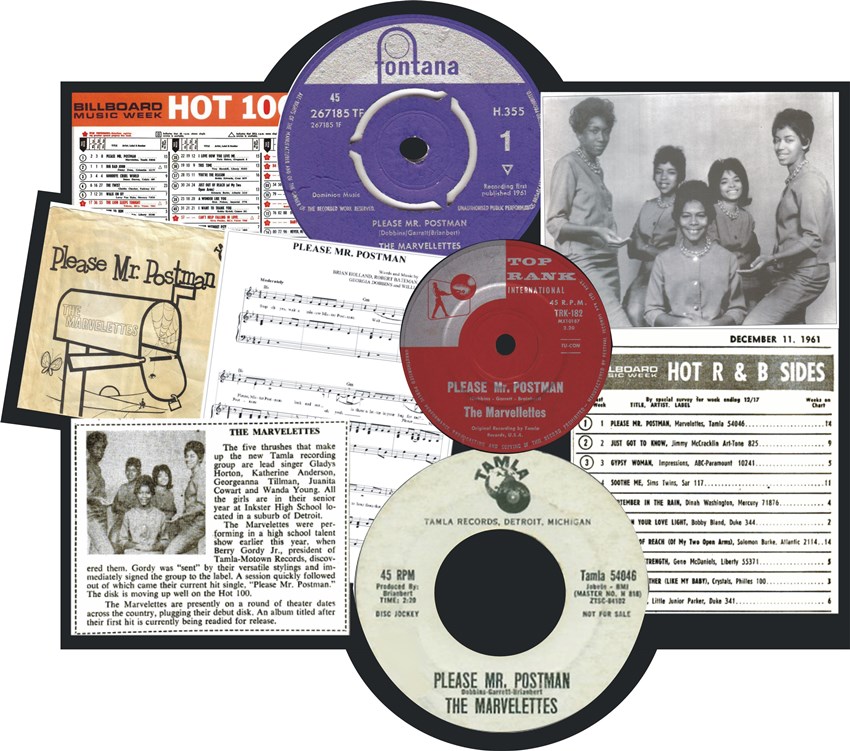
The Marvelettes — “Please Mr Postman b/w So Long Baby” — Tamla 54046 passed the company’s muster and was released on August 21 and within two weeks was making ripples beyond the Motor City. On September 4th the 45 entered the Billboard Charts and fourteen weeks later it hit the #1 spot. The name of The Marvelettes and their Detroit based Tamla label was on the lips of every record buying teenager in the US. What happened next was that the girls were subject to a whirlwind as they became in demand. The success of the song gave Gordy’s company a good slice of impetus and in order to make the most of that they needed the girls to record an album using the title of the song, (which they did) and present themselves to their public on stage, heightening the image of the company and increasing the record buying public’s awareness of Gordy’s labels. Only one week after hitting the #1 spot with the 45 the company released their album The Marvelettes — “Please Mr Postman” — Tamla LP #228.
One complication as far as live performances were concerned was that the girls, apart from Wanda, were all underage. In addition Gladys, as an orphan, was a ward of the court and would need a legal guardian appointed. Despite these obstacles, the girls, excused from school and with Gladys now the responsibility of Mr and Mrs Edwards, Berry’s sister and Brother In Law, were soon integrated into current Motown Live Shows which consisted of Eddie Holland, Marv Johnson, Mary Wells and The Miracles and became the star of the show. Studying between shows, the girls tread the boards of such famous theatres as Washington DC’s Howard Theater, The Royal in Baltimore and of course The Apollo in New York’s Harlem. With The Marvelettes star on a meteoric rise they’d gone from five inexperienced teenage schoolgirls to the biggest selling group with a #1 Top hit and a tour schedule all in a matter of a few months! It was time now to consolidate that success and the company had just the thing to do it with. A follow up single that they released just as, “Please Mr Postman” peaked.
With Philly’s Chubby Checker’s 1960 version of the Hank Ballard original having spawned a myriad of successful imitations, that dance craze of the era, ‘The Twist’ was at its height as teenagers across the US took to their dance-floors to gyrate to the latest version of the theme. Like most other record companies, Motown were no strangers to limpeting onto the latest dance craze and had already tested the waters with a couple of outings on the Motown logo from a group called The Twisting Kings. (4) The Marvelettes second release, The Marvelettes — Twisting Postman b/w I Want A Guy — Tamla 54054, extended the theme of the postman from their initial outing, with a young girl sat patiently for him to deliver the letter from her guy. Only this time he seems hell bent on dancin’ round his route! The 45 was coupled with a song that The Supremes had already recorded the previous March but had seen fail to make any impact commercially. Although the group’s second release couldn’t recreate a #1 chart-topping smash it did reach #13 on the RnB Chart and narrowly miss a Top 30 spot on the pop equivalent when it peaked at #34. An appearance on the 5th March episode of America Bandstand hosted by Dick Clark, during which the Inkster High School football team’s (The Vikings), game was postponed to allow the students to watch their classmates on TV, no doubt encouraged sales and the girls were now a regular feature of the theaters as they continued appearing with the other star acts of the Motown stable of labels. (5)
The year 1962, continued to see the girls careers flourish when they released their third single The Marvelettes — Playboy b/w All The Love I’ve Got — Tamla 45060 which bludgeoned its way to a Top 10 position on both charts (#4 RnB/#7 Pop). Once again the 45 credits Bateman, Holland, Mickey Stevenson and Gladys Horton but Gladys insists that the song came from her pen alone and is a song on which Gladys advises her suitor to stay away from her door as she has his ticket marked as a guy who plays around. The group now had a signature style of sound that, although built on the en vogue girl group sound had, by fluke or design, identified them as the sound of Motown alongside Mary Wells and The Miracles.
In the balmy summer days of 1962 The Marvelettes released their fourth 45 in just over a year, The Marvelettes — “Beechwood 4-5789 b/w Someday, Someway” — Tamla 54065, a song co penned by Marvin Gaye just prior to him achieving his own solo success as a singer on which Gladys Horton sets her sights on a guy and in an effort to get to know him better gives him her telephone number with the instructions to call her anytime. The girls’ vocals were actually sung over a pre-recorded backing tape which Mickey Stevenson had produced whilst they had been on the road. This unusual but necessary process, due to the time the girls spent on the road didn’t detract from the final outing as the 45, once it hit the record shops zipped into the Billboard Hot 100 RnB Chart where it made #7 and secured a #17 spot on the industry leading magazine’s pop equivalent. The girls were by now well established and a third album was released to coincide with their chart entry, (a second one having been released the previous April to try and extend the life of Twistin’ Postman’s popularity: The Marvelettes - Smash Hits Of ‘62 — Tamla 229), (6) The Marvelettes — Playboy — Tamla 231 was a disappointment in terms of sales and failed to chart, as indeed had the previous one. It did however, at last feature the ladies on the cover which is something the first two didn’t.
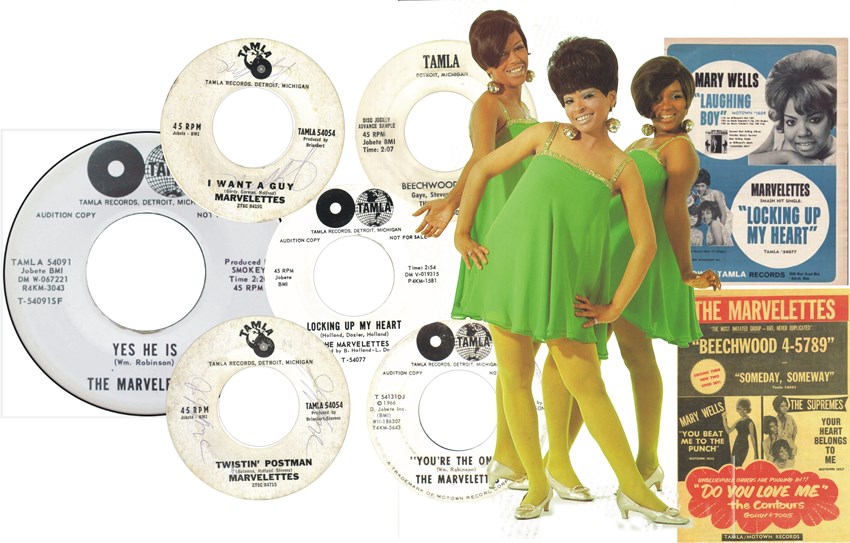
Flying in the face of poor album sales the group’s popularity continued to grow but not all the girls however were enjoying their time in the limelight and Wyanetta Cowart, who suffered from what could be described as a nervous breakdown, took the decision to withdraw from the spotlight and return to a quiter, more structured lifestyle that she felt more comfortable with. A naturally quiet teenager, having been thrust into a world of recording sessions, choreography lessons, live appearances on stage and TV and surrounded by strangers, she came to realise that the hectic pressure cooker of the entertainment world wasn’t quite the glittering life she had envisioned. And so the group became a quartet. It’s probably worth noting that The Marvelettes were the first really successful group that Motown had. The legendary Artists Talent and Management structures that Gordy would embrace as the company grew, utilising the skills of the likes of Cholly Atkins, Miss Maxine Powell etc weren’t yet in place and the company left the group much to its own devices when learning the skills of hair, make up, choreography, etc.
In the autumn of 1962, Berry Gordy, probably soured on by the receipts of the initial out of town live shows the company had arranged for its artists, had his company put together its first full blown Motown Revue Tour that saw him convince Henry Wynne, who headed up the major black entertainment booking agency: Supersonic Attractions, that a tour consisting of a large group of Motown based acts had a great chance of generating good amounts of revenue. (7) Planned by his sister Esther, managed by Thomas ‘Beans’ Bowles, (one of the company’s first musicians) and utilising a band put together by Choker Campbell, 45 artists, musicians, and assorted staff embarked on what would became a remarkable chapter in the history of Motown as well as the members of the tour.
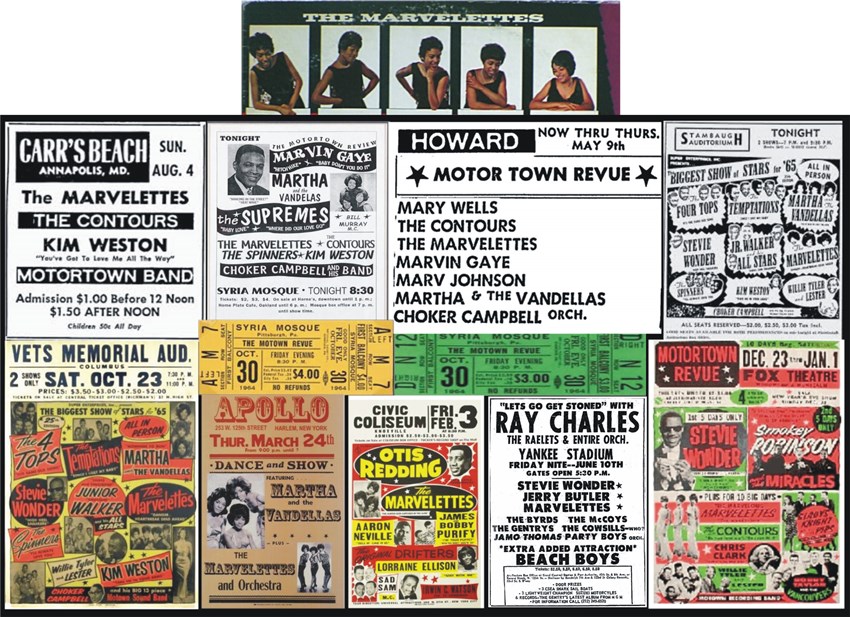
Encompassing the Southern States it would be many of the tour members first sojourn into the segregated States of Alabama, Mississippi, Georgia and Louisiana and was fraught with tension as their bus was similar to the ones used by the Freedom Riders of the 60s (8) The Marvelettes’ experience of The Motown Revue of 1962 led to their eyes being opened to the racially separated infrastructure of the Southern States.
“Although I had been in The South, I had never experienced the racism to the magnitude that I did when I went on that Motown Tour. It’s a different ballgame when you’re in a little country town, because all you’re going to and all your visiting is that little country town. However, when you’re visiting many of the major cities in the South, then the experiences are greater. And it became very, very … frightening.” — Katherine Anderson
Playing to packed houses every night the girls endured the hardships of being on tour in The South, focusing on using their performances to lighten their experiences with the toilet facilities, the lack of changing rooms, not being able to stop safely for gas, or even at a restaurant of their choosing and ended the tour on 17 December before heading back to Detroit which allowed for spending time with their families during the festive holiday. Detroit’s Fox Theatre appearances permitting of course!
As the Motown Revue embarked the girls released their next 45, The Marvelettes — Strange I Know b/w Too Strong To be Strung Along - Tamla 54072 which may well have been the final chapter in the boyfriend/missing letter tale of their previous outings. Set at a pedestrian pace once again it is Gladys on lead as she tells the story of moving on with her life as her previous love seems determined to ignore her via any means including letters or calls. The song was ideal in that it gave the girls a brief respite when performing as all their other hits had been uptempo ones. The record buying public liked the song enough to propel it to a #10 spot on the RnB Chart but it stalled at #49 on the Pop equivalent, the first time a Marvelettes release hadn’t made the Billboard Hot 100 Top 40.
The next release from the group in the Spring of 1963 featured a double, split lead vocal from Gladys and Wanda on a song that would also see (possibly for the first time), an undisputed Holland - Dozier - Holland writing credit. (9) The Marvelettes — “Locking Up My Heart b/w Forever” — Tamla 54077, gave listeners a glimpse of the song writing team’s penchant for strong beats, sax breaks and drum fills although they weren’t quite into their stride on this tale of a heartbroken lover that’s decided enough is enough. The flip of the 45 actually gained enough radio play to entice record buyers to buy it for that side too and both sides wwere allocated a similar chart position. The A side making #25 RnB and the flip #24 whilst both sides made #44 on the Pop Chart.
The Marvelettes continued to record and release 45s throughout 1963, all stumbling in the lower reaches of the nation’s charts and even the addition of Smokey Robinson as a songwriter couldn’t generate the success they had previously enjoyed. Of course this was the period when Gordy took to pushing his new girl group The Supremes headed by a headstrong and ambitious young Diana Ross which probably impacted on the further development of The Marvelettes. The girls were even released under a pseudonym on The Darnells — Too Hurt To Cry, Too Much In Love To Say Goodbye — b/w Come On Home - Tamla 7024 which they didn’t realise until they heard themselves on the radio! Although their popularity as a girl group seemed to be waning, on the romance side of things, two of our heroines sealed the matrimonial knot with Wanda Young marrying Bobby Rogers of The Miracles and Georgeanna Tillman becoming the wife of Billy Gordon of The Contours. Motown really was keeping it all in the family!
1964 saw the group release a further trio of 45s bringing their releases to a total of 14, (including the Darnells and 2 sided T#54077 discs), proof if it were required that the Hitsville music making machine was gathering momentum now and churning out song after song on acts whilst having artist record the same songs as each other too. With the song-writing and production talents of Holland Dozier Holland, Smokey Robinson, and Norman Whitfield (10), in full swing the stage was set for the company to dominate the radio airwaves and the musical charts. With Martha and The Vandellas flying high and The Supremes breaking internationally The Marvelettes had some real competition and some would say that their ‘girl group’ image was looking a little dated but the third of those 1964 releases sent the group back into the charts. The Marvelettes — “Too Many Fish In The Sea b/w a Need For Love” — Tamla 54105 was the result of an early song-writing collaboration between Eddie Holland and Norman Whitfield and Mr Whitfield produced a powerhouse of upbeat, uptempo dance soul that would see Wanda’s lead now to the fore, something that would remain for the rest of their recording career. The 45 is also noteworthy due to the fact that Georgeanna Tillman would make her last appearance on a Marvelettes 45 as poor health would mean she had no choice but to leave the group shortly after its release. Georgeanna was diagnosed with sickle cell anemia and systemic lupus a chronic disease that led to an overactive immune system and leads to extreme fatigue in the sufferer. In Georgeanna’s case this was intensified due to the strains of being on the road, bad eating habits, irregular sleeping patterns etc. The usually happy go lucky Georgeanna would stay within the Motown ‘family’ though and took up a position as a secretary within the Hitsville ranks. The quartet had now become a trio.
As Merseysides Fab Four led the assault on the US charts by what became known as the Brit Invasion and the girl group phenomenon enjoyed by the likes of The Shirelles, The Crystals, The Marvelettes etc finally waned the group released a hard driving, less innocent sounding dancer that has always struck a chord with their UK soul fans, The Marvelettes — I’ll Keep Holding On — b/w No Time For Tears — Tamla 54116 which Wanda now established as the lead vocalist delivered with a punchy, almost aggressive style not heard on previous Marvelettes outings. The girls performance matched the Mickey Stevenson produced backing track that had that 1965, driving Funk Brothers signature sound brimming with drum fills, a strong bass line and metronome like tambourine enhancements. Stevenson had such faith in the song that, faced with awaiting the return of the girls from their live schedule to the studio on West Grand Boulevard, he had the Funk Brothers record the track alone and flew with the tape to New York and had them overdub the vocals there before returning to Motown’s famous Quality Control meeting and receiving the go ahead for the release. It proved to be a good decision as the 45 made #11 on the RnB Chart.
In the summer of that year the group released another 45 that would come to help define them when, The Marvelettes — “Danger and Heartbreak Dead Ahead b/w Your Cheating Ways” — Tamla 54120, a song penned by Clarence Paul, Ivy Jo Hunter and Mickey Stevenson that once again Wanda performs lead on. A signature Motown 45 overflowing with the all the musical components that built the company, tight musicianship incorporating a solid bassline, tambourine on the backbeat, drum fills a go go, a great piano riff and effervescent horn interludes and of course, it’s all augmented by the fantastic supporting harmonies by The Andantes. The 45 went to equal its predecessor in terms of RnB commercial success when it too peaked at #11 on the RnB Chart but flailed around in the lower regions of the Pop equivalent stumbling at #61. The song did however, become a favourite of the group’s live stage shows as they built it into their repertoire using neon placards as they performed in a black light environment.
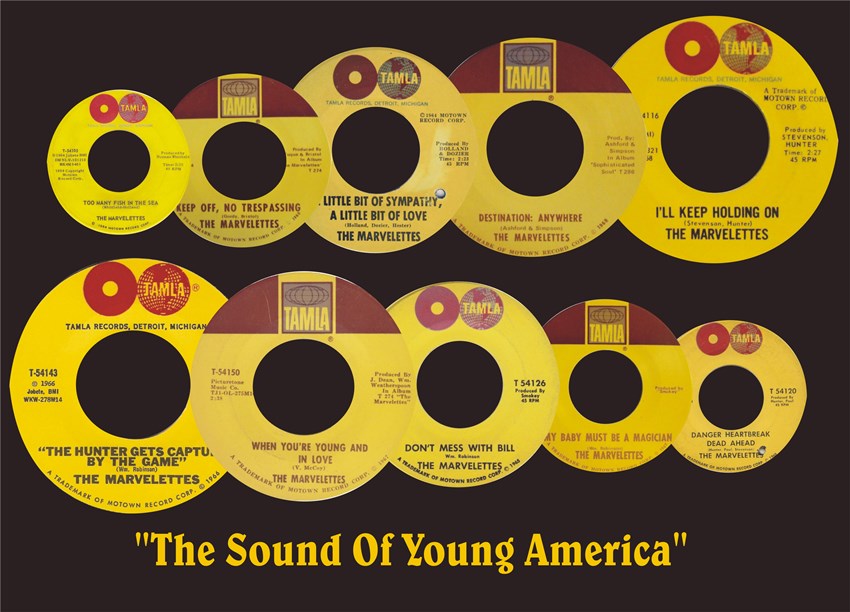
One event that seems to highlight how The Marvelettes were maybe slipping from Motown’s priorities is the fact that in the same year (1965) Motown undertook their landmark Motown Revue of UK that resulted in the TV Show ‘The Sounds Of Motown’, hosted by UK soul songstress Dusty Springfield but the name of The Marvelettes was missing from the roster. In addition, the flow of albums by the group that had been established back in 1961 had dried up, despite the reasonable success of their recent 45s. I guess with The Four Tops, The Temptations and especially The Supremes now regularly elbow-ing the competition out for the top Chart spots it was inevitable that groups would find themselves in a tiered hierarchy. Motown’s investment in its artists was by now though, in full flow and The Marvelettes were part of the Artist Development division system that saw them benefit from the skills of Cholly Atkins and Miss Maxine Powell, the two main mentors to Gordy’s artistic roster. Mr Atkins being a premium dance instructor and Miss Powell, an ex ‘finishing school’ owner ran courses that developed the personal skills in the artists. Of course by the time Gordy had these structures in place The Marvelettes were already seasoned stage hands etc.
With Gordy’s proteges The Supremes, now fully fledged International stars, leading the charge, the country’s premium nightspots like New York’s The Copacabana and The Lincoln Center were where Motown used show tunes, cover versions, hits of their own and a dynamic stage show to forge it’s place in the mainstream white entertainment world but this was an opportunity that The Marvekletees, probably due to being still viewed as a ‘girl group’ and a link to a world left behind by Motown. It was anything but doom and gloom as far as the music was concerned however and Smokey Robinson delivered the vehicle that would revive their chart activity. The Marvelettes — “Don’t Mess With Bill b/w Anything You Wanna Do” — Tamla 54126, furnished Wanda with the opportunity to employ a more racy, somewhat seductive side to her singing as she laments the behaviour of her lover whilst warning other suitors about him. Initially Robinson had to fight tooth and nail to get the song through the quality control meeting as many at Motown thought the mid paced, adult themed song may be a little too much for fans of the group. Smokey eventually won out and the song was released in November. A great, laid back backing track from the Funk Brothers, full of strategic vibes and a passionate sax solo half way through gave the girls the platform to return them to the Top 10 of Billboard’s Pop Charts peaking at #7 and going even higher on the RnB listing, making the #3 spot. The success of ‘Don’t Mess With Bill’ provided the impetus for a Greatest Hits album which would prove to be the group’s best selling LP when it reached #4 (RnB).
Smokey’s appreciation of the girl’s now mature sound was again to play a part in getting the group’s performances onto wax and into the market. The Marvelettes — “The Hunter Gets Captured By The Game b/w I Think I Can Change You” — Tamla 54143 coupled two Robinson penned songs that he also performed the studio productions on. Once again it’s a laid back performance starting with a lamentable harmonica intro from the Funks that Smokey ensures is subdued enough to bring out the best in Wanda’s sultry vocal as she relays the story of how she set out to capture her man but he turned the tables and captured her. Released between Christmas and New Year in 1966 fans of the group pushed sales of the 45 and by early spring the following year it had delivered the outing to #2 RnB and #13 Pop in the trade papers. Hot on the heels of this release came a strange one, strange for Motown at least. Rarely did the company look outside for material which isn’t really surprising when you look at their song-writing roster but the next release by the ladies came from the open of a Northern Soul hero who is also an inaugural Inductee in our Hall Of Fame : Van McCoy.
Originally a minor hit for Ruby and The Romantics in 1964 Van McCoy’s song would not only maintain the group’s presence in the US Charts but would deliver a bona fide hit in UK too when it reached #13 on the BBC’s Top 40. The Marvelettes — “When You’re Young And In Love b/w The Day You Take One You Have To The Other” — Tamla 54150, opens with a majestic drum roll, piano and fading string introduction that gives way to Wanda’s interpretation of what would become a classic. The whole song is awash with an orchestral feel that producers James Dean and William Witherspoon pull off with great aplomb. Although Gladys and Katherine aren’t on the recording the ever present Andantes deliver the perfect style and substance that resulted in #3 RnB and #23 Pop placings for the group in the early summer of 1967.
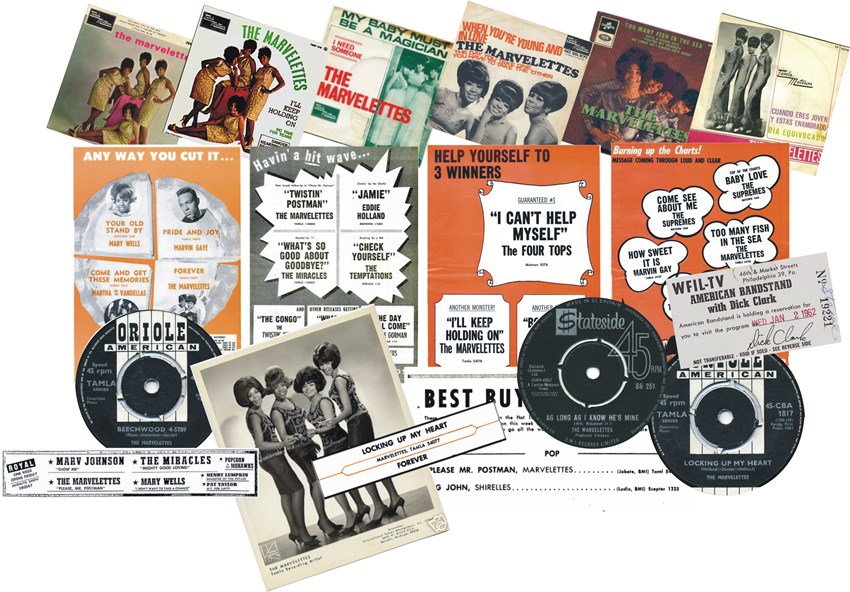
The Marvelettes were about to say goodbye to Gladys Horton who had by now married trumpeter Sammy Coleman and was expecting their first child. (11). Whereas before when Georgeanna and Wyanetta had exited the line up the remaining members simply carried on Katherine and Wanda needed a third voice and after a length of inactivity from Motown and on the advice of Harvey Fuqua they successfully auditioned Ann Bogan who became their latest member. (Ann Bogan’s story can be found as part of the Soul Source Inductee page of The Andantes, a group with which she also sang). After a period of rehearsal, and striking while the musical iron was hot via their last 2 releases, the trio were off on a tour of the military bases of Germany where Ann appeared as a Marvelette for the first time. On their return to Detroit it was back to the snakepit for a another recording session with Smokey Robinson, their first one without Gladys and with Ann. If they were worried about the vocal dynamics changing, they needn’t have done, as The Marvelettes — “My Baby Must Be A Magician b/w I Need Someone” — Tamla 54158, displayed all the Marvelettes hallmarks of previous hits and, with its opening sliding guitar glide courtesy of Marvin Tarplin (12) and Temptations member, Melvin Franklin’s unique deep bass vocal contribution, put them at #8 RnB and #17 Pop in the spring of 1968. They had, by this stage been gracing the musical charts of America for 7 years.
Three singles followed in 1968 all of them fluttering around the lower regions of the charts but none matching their previous outings. Smokey furnished “Here I am Baby” (T-54166), a song first recorded by Barbara Mcnair a year earlier and Nick Ashford and Valerie Simpson contributed “Destination Anywhere” (T- 54171) which were all great efforts but couldn’t sustain the sales for the group that their earlier hits had.
1969 would deliver a tragic blow to Wanda when her younger sister La Mona was brutally shot and murdered by her brother in law who mistook her for Wanda’s other sibling Dora. By this time Wanda was also beginning to suffer from the effects of drugs and alcohol and those closest to her believe that something happened on the European Tour that instigated her spiral into experimenting with substances. Whatever the catalyst, the usually bubbly and effervescent young singer became difficult to manage and the writing was on the wall for the trio.
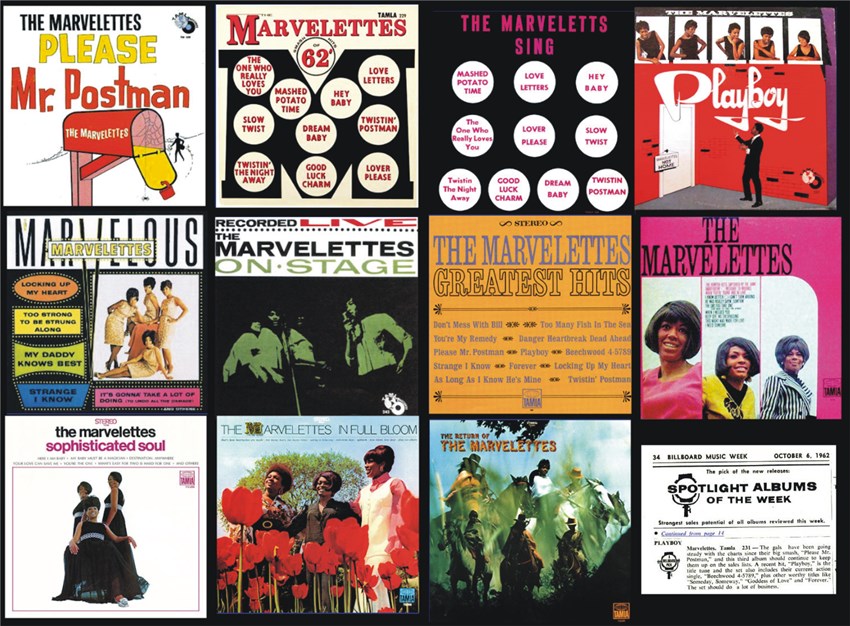
In September 1969 the group released a noteworthy rendition of a classic song previously recorded by a number of soul acts including The Spinners and Baby Washington as The Marvelettes — “That’s How Heartaches Are Made b/w Rainy Mourning” — Tamla 54186, a song that saw Clay McMurray on production duties and an outing that derived more success than it achieved as it sank without trace. In 1970, they released another Smokey produced 45 with, The Marvelettes — “Marionette b/w After All” — Tamla 54198 which suffered a similar fate and in January 1972, after a gap of almost eighteen months in which Wanda’s addiction became more severe and the girl’s stopped not only recording but also touring and the releases of The Marvelettes concluded with The Marvelettes — “A Breathtaking Guy b/w You’re The One For Me” — Tamla 54213.
For Northern Soul fans that’s not quite the end of the story though. Nestled as the opening song on Side 2 of their eighth LP, (The Marvelettes - Sophisticated Soul — Tamla # 286), sits a recording that would maybe have a right to claim to be the most played Northern soul outing that the group recorded. “Your Love Can Save Me” was a song written by Nick Ashford and Valerie Simpson that any soul fan around in the mid -70s will instantly recognise a floor filler of the time that for many years was believed to be only available on this particular LP. However, there is indeed a 7 inch version of the song as it appears on a promo only EP (#286) that includes 4 songs, all taken from the LP. As a promo item it’s a strange one. Motown rarely promoted their LPs in this way and were quite happy to concentrate on promoting other groups at the time. Still, it gives the collector something to chase 40 years later eh?
The closing song on Side 1 of the very same LP “Reaching For Something That I Can Have” is also a song that received played on the Northern soul circuit and only appeared in limited 7 inch format, this time on a UK released 45 in 1973 (TMG #701). Over the years many unreleased songs from the Motown vaults have seen the light of day and The Marvelettes are no exception. Songs as diverse as the doo wop inspired “Grass Is Greener (On The Other Side)” through to the inspirational Northern dancer “The Boy From Crosstown” have all come to light over the years and are available on CDs. For those that have that completist’s collectors gene to satiate there are also a couple of rather cool items to look out for too. When Gordy used the Mini LP route to promote their full blown equivalents The Marvelettes were included in the list and their ‘pink’ album came out as a 7inch EP with six tracks culled from the LP. In addition, “Please Mr Postman” was also issued amongst the novelty Topps cardboard pic discs with a great photo of the ladies on the playing side and a bio on the flip.
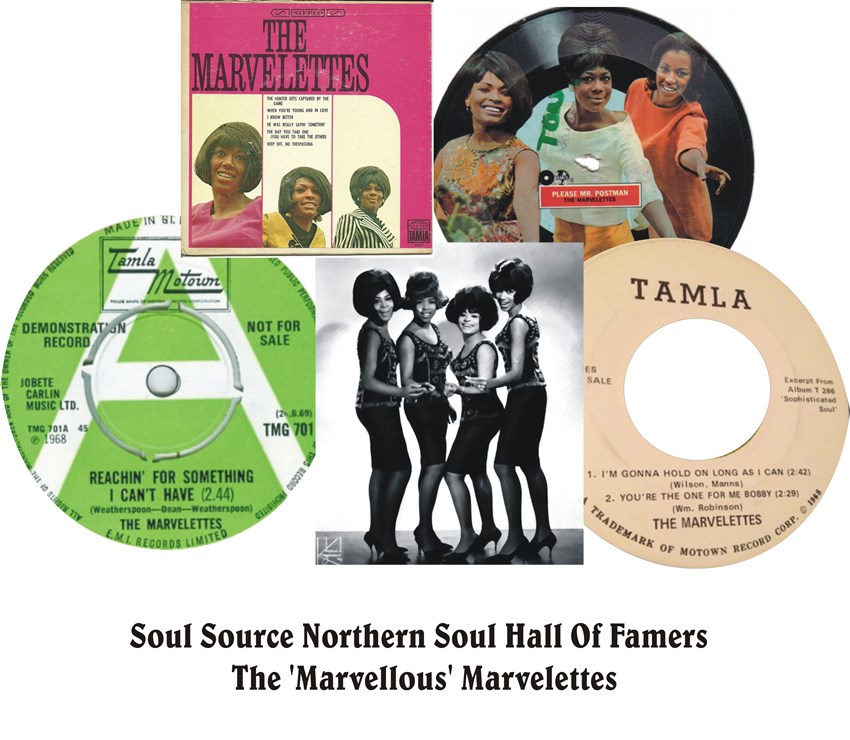
Georgeanna Tillman Gordon, who had suffered with sickle cell anaemia and lupus, sadly passed away at her Mothers Inkster home on 7 January 1980, after battling her illness since she had been forced to leave the group in 1965. She was a tragically young 35 years old.
The Marvelettes as a group, in its various compositions, recorded at Hitsville USA for over a decade, had experienced a #1 Smash hit, had toured extensively at home and overseas, delivered some amazingly danceable records and left a legacy that few groups of the era can match, that’s why we at Soul Source are extremely proud to induct them into our Hall Of Fame as part of our Inaugural Inductees.
Dave Moore — February 2015
Notes and References:
- Joe Van Battle owned a record store at 3530 Hastings Street Inkster and was a local record producer who recorded his earliest recordings in a small studio in the back of the shop which was situated on what is now an on ramp for the I-94 freeway. Joe’s label, which specialised in Jazz, Gospel and early RnB is famous for introducing the world to such luminaries as John Lee Hooker, Memphis Slim and the Rev C L Franklin’s young daughter Aretha. The label would eventually change its name to Battle and move its operation to New York in 1962 when it was bought out by Bill Grauer who also owned Riverside Records and would continue releasing 45s until as late as 1964.
- Quote from The Marvelettes:Motown’s Mystery Girl Group by Marc Taylor, dated 2004. IBSN0965232859.
- In the early years of Gordy’s empire the company wasn’t registered with the Recording Industry Association of America, (R.I.A.A) and so there was no access to identify exactly how many copies of records were sold in order to certify Gold Records to companies/artists.
- The Twisting Kings were in fact various members of the Motown house band: The Funk Brothers. As well as the two 45s they released on Motown, they also recorded an album as The Twisting Kings — Twistin’ Around The World — Motown #501 which was a series of impromptu, (or at least they sound impromptu), twist jams from the legendary musicians.
- On that particular broadcast of American Bandstand, Wyanetta, when asked where the girls were from, unintentionally commented that Detroit was a suburb of Inkster which resulted in her receiving quite a bit of teasing from her peers.
- The Marvelettes - The Smash Hits Of ‘62 - (Tamla #229), was released with two separate jacket/covers, the first one with the aforementioned title but this was then re-released a few months later as the newly retitled “The Marveletts Sing”, with the group’s name incorrectly spelt. Why? Your guess is as good as mine.
- Henry Wynne was a black, street savvy, entrepreneur whose company, Supersonic Attractions made good use of the now established string of theaters, venues and lounges that became known as The Chitlin’ Circuit. In 1960, he purchased The Royal Peacock in Atlanta, Georgia and was responsible for bringing acts such as Otis Redding, Wilson Pickett, Ike And Tina Turner and the Motown acts to the Southern United States.
- Freedom Riders was the collective name given to people who rode the interstate buses into the Southern States to challenge the non-enforced law that made segregated buses illegal. US Law at the time made segregated interstate buses illegal but many States ignored the ruling and maintained the Jim Crow Law. The Freedom Riders played a large part in civil rights movement, acting as the catalyst for many more protests throughout the country.
- There is some ambiguity as to which 45 first saw the real appearance of the legendary writing team of Holland —Dozier - Holland in that Lamont Dozier’s, “Dearest One” outing, on Mel-O-Dy (# 102) also has the credit but it’s not clear whether Lamont actually wrote part of the song.
- A point of interest is that the flip to The Marvelettes — “You’re My Remedy b/w A Little Bit Of Sympathy, A Little Bit Of Love” — Tamla 54097 was composed by Eddie Holland, Lamont Dozier and a certain Mr Tony Hestor. Of course Tony Hester would go on to gain cult status amongst Northern Soul fans as his work with Popcorn Wylie, Don Davis and The Dramatics as well as his own recordings testify.
- Sammy Coleman was once the trumpeter for Joe Tex’s backing group.
- Marv Tarplin was the long-time guitarist to Smokey Robinson and their relationship went back to the early days of the Motown company’s formation. So integral was Tarplin to the group that he even appeared on the pic cover to The Miracles — “I Like it Like That” — Tamla 54098 and “The Fabulous Miracles LP” (# 238)
Discography:
The Marvelettes - Please Mr. Postman / So Long Baby — Tamla 54046
The Marvelettes - Twistin' Postman / I Want A Guy — Tamla 54054
The Marvelettes - Playboy / All The Love I've Lost — Tamla 54060
The Marvelettes - Beechwood 4-5789 b/w Someday, Someway — Tamla 54065
The Marvelettes - Strange I Know b/w Too Strong To Be Strung Along - 54072
The Marvelettes - Locking Up My Heart b/w Forever - 54077
The Marvelettes - Tie A String Around My Finger b/w My Daddy Knows Best — Tamla 54082
The Marvelettes- As Long As I Know He's Mine b/w Little Girl Blue - 54088
The Marvelettes - He's A Good Guy (Yes He Is) b/w Goddess Of Love — Tamla 54091
The Marvelettes - Yes He Is b/w Blank — Tamla 54091
The Marvelettes - You're My Remedy b/w A Little Bit Of Sympathy, A Little Bit Of Love — Tamla 54097
The Marvelettes - Too Many Fish In The Sea b/w A Need For Love — Tamla 54105
The Marvelettes - I'll Keep Holding On b/w No Time For Tears — Tamla 54116
The Marvelettes - Danger, Heartbreak Dead Ahead / Your Cheating Ways — Tamla 54120
The Marvelettes - Don't Mess With Bill b/w Anything You Wanna Do — Tamla 54126
The Marvelettes - You're The One b/w Paper Boy — Tamla 54131
The Marvelettes - When The Hunter Gets Captured By The Game b/w I Think I Can Change You — Tamla 54143
The Marvelettes - When You're Young And In Love / The Day You Take One, You Have To Take The Other — Tamla 54150
The Marvelettes - My Baby Must Be A Magician b/w I Need Someone — Tamla 54158
The Marvelettes - Destination: Anywhere b/w What's Easy For Two Is So Hard For One - 54171
The Marvelettes - I'm Gonna Hold On Long As I Can b/w Don't Make Hurting Me A Habit — Tamla 54177
The Marvelettes - That's How Heartaches Are Made b/w Rainy Morning — Tamla 54186
The Marvelettes - Marionette b/w After All — Tamla 54198
The Marvelettes - A Breath Taking Guy b/w You're The One For Me Baby — Tamla 54213
Author Profile: Dave Moore
Dave Moore | Dave Moore
Dave Moore is a long time record collector who has been an Administrator on Soul Source for over 20 years. The site's 'Soul Source Hall Of Fame' was his creation and he contributes articles on a regular basis. He authored the book, 'Philly Soul - It's Roots And History' and was the publisher of There's That Beat! magazine. He is also the promoter of The Benidorm International Soul Fiesta and The Hitsville Rare Soul Weekender.
Explore more of their work on their author profile page.

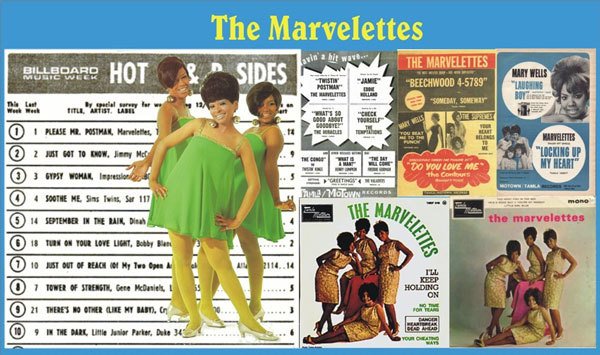
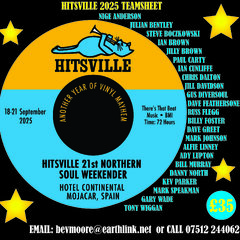

Recommended Comments
Get involved with Soul Source